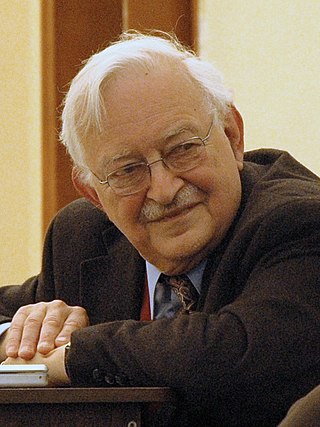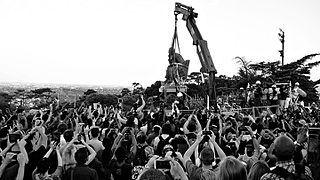Related Research Articles

The Zapatista Army of National Liberation, often referred to as the Zapatistas, is a far-left political and militant group that controlled a substantial amount of territory in Chiapas, the southernmost state of Mexico.

A political movement is a collective attempt by a group of people to change government policy or social values. Political movements are usually in opposition to an element of the status quo, and are often associated with a certain ideology. Some theories of political movements are the political opportunity theory, which states that political movements stem from mere circumstances, and the resource mobilization theory which states that political movements result from strategic organization and relevant resources. Political movements are also related to political parties in the sense that they both aim to make an impact on the government and that several political parties have emerged from initial political movements. While political parties are engaged with a multitude of issues, political movements tend to focus on only one major issue.

Freeganism is an ideology of limited participation in the conventional economy and minimal consumption of resources, particularly through recovering wasted goods like food. The word "freegan" is a portmanteau of "free" and "vegan". While vegans avoid buying, consuming, using, and wearing animal products as an act of protest against animal exploitation, freegans—at least in theory—avoid buying anything as an act of protest against the food system in general.

A social movement is a loosely organized effort by a large group of people to achieve a particular goal, typically a social or political one. This may be to carry out a social change, or to resist or undo one. It is a type of group action and may involve individuals, organizations, or both. Social movements have been described as "organizational structures and strategies that may empower oppressed populations to mount effective challenges and resist the more powerful and advantaged elites". They represent a method of social change from the bottom within nations. On the other hand, some social movements do not aim to make society more egalitarian, but to maintain or amplify existing power relationships. For example, scholars have described fascism as a social movement.

Anthony Giddens, Baron Giddens is an English sociologist who is known for his theory of structuration and his holistic view of modern societies. He is considered to be one of the most prominent modern sociologists and is the author of at least 34 books, published in at least 29 languages, issuing on average more than one book every year. In 2007, Giddens was listed as the fifth most-referenced author of books in the humanities. He has academic appointments in approximately twenty different universities throughout the world and has received numerous honorary degrees.

Immanuel Maurice Wallerstein was an American sociologist and economic historian. He is perhaps best known for his development of the general approach in sociology which led to the emergence of his world-systems approach. He was a Senior Research Scholar at Yale University from 2000 until his death in 2019, and published bimonthly syndicated commentaries through Agence Global on world affairs from October 1998 to July 2019.

The Gwangju Uprising, known in Korean as May 18, took place in Gwangju, South Korea, in 1980. The uprising was a response to the coup d'état of May Seventeenth that installed Chun Doo-hwan as military dictator and implemented martial law. Following his ascent to power, Chun arrested opposition leaders, closed all universities, banned political activities, and suppressed the press. The uprising was violently suppressed by the South Korean military. The uprising is also known as the May 18 Gwangju Democratization Movement, the Gwangju Democratization Struggle, the May 18 Democratic Uprising, or the Gwangju Uprising.

Infoshops are places in which people can access anarchist or autonomist ideas. They are often stand-alone projects, or can form part of a larger radical bookshop, archive, self-managed social centre or community centre. Typically, infoshops offer flyers, posters, zines, pamphlets and books for sale or donation. Other items such as badges, locally produced artworks and T-shirts are also often available. Infoshops can also provide printing and copying facilities for people to produce their own literature or have a meeting space.

Asef Bayat is an Iranian-American scholar. He is currently the Catherine and Bruce Bastian Professor of Global and Transnational Studies, Sociology, and Middle Eastern studies at University of Illinois at Urbana-Champaign. He was previously a Professor of Sociology and Middle Eastern studies and held the Chair of Society and Culture of the Modern Middle East at Leiden University, The Netherlands. He served as Academic Director of the International Institute for the Study of Islam in the Modern World (ISIM) and ISIM Chair of Islam and the Modern World at Leiden University.

Social movement theory is an interdisciplinary study within the social sciences that generally seeks to explain why social mobilization occurs, the forms under which it manifests, as well as potential social, cultural, political, and economic consequences, such as the creation and functioning of social movements.
Autonomism, also known as Autonomist Marxism, is an anti-capitalist social movement and Marxist-based theoretical current that first emerged in Italy in the 1960s from workerism. Later, post-Marxist and anarchist tendencies became significant after influence from the Situationists, the failure of Italian far-left movements in the 1970s, and the emergence of a number of important theorists including Antonio Negri, who had contributed to the 1969 founding of Potere Operaio as well as Mario Tronti, Paolo Virno and Franco "Bifo" Berardi.
Jack A. Goldstone is an American sociologist, political scientist, and historian, specializing in studies of social movements, revolutions, political demography, and the 'Rise of the West' in world history. He is an author or editor of 13 books and over 150 research articles. He is recognized as one of the leading authorities on the study of revolutions and long-term social change. His work has made foundational contributions to the fields of cliodynamics, economic history and political demography. He was the first scholar to describe in detail and document the long-term cyclical relationship between global population cycles and cycles of political rebellion and revolution. He was also a core member of the "California school" in world history, which replaced the standard view of a dynamic West and stagnant East with a ‘late divergence’ model in which Eastern and Western civilizations underwent similar political and economic cycles until the 18th century, when Europe achieved the technical breakthroughs of industrialization. He is also one of the founding fathers of the emerging field of political demography, studying the impact of local, regional, and global population trends on international security and national politics.
William Anthony Gamson was a professor of Sociology at Boston College, where he was also the co-director of the Media Research and Action Project (MRAP). He is the author of numerous books and articles on political discourse, the mass-media and social movements from as early as the 1960s. His influential works include Power and Discontent (1968), The Strategy of Social Protest (1975), Encounters with Unjust Authority (1982) and Talking Politics (2002), as well as numerous editions of SIMSOC.
Prefigurative politics are the modes of organization and social relationships that strive to reflect the future society being sought by the group. According to Carl Boggs, who coined the term, the desire is to embody "within the ongoing political practice of a movement [...] those forms of social relations, decision-making, culture, and human experience that are the ultimate goal". Besides this definition, Leach also gave light to the definition of the concept stating that the term "refers to a political orientation based on the premise that the ends a social movement achieves are fundamentally shaped by the means it employs, and that movement should therefore do their best to choose means that embody or prefigure the kind of society they want to bring about". Prefigurativism is the attempt to enact prefigurative politics.

Neozapatismo or neozapatism is the political philosophy and practice devised and employed by the Zapatista Army of National Liberation, who have instituted governments in a number of communities in Chiapas, Mexico, since the beginning of the Chiapas conflict. According to its adherents, it is not an ideology: "Zapatismo is not a new political ideology or a rehash of old ideologies. .. There are no universal recipes, lines, strategies, tactics, laws, rules or slogans. There is only a desire: to build a better world, that is, a new world." Many observers have described neozapatismo as libertarian socialist, anarchist, or Marxist.
Charles Derber is an American Professor of Sociology at Boston College. His work focuses on the crises of capitalism, globalization, corporate power, neo-fascism, American militarism, the culture of hegemony, the climate crisis, and the new peace and global justice movements.

ROAR Magazine was an independent publication that described itself as a “journal of the radical imagination.” Its stated aim was to “provide grassroots perspectives from the front-lines of the global struggle for real democracy.”
The 1988 annual meetings of the International Monetary Fund (IMF) and World Bank were met with an international protest in West Berlin. Whereas the organizations' earlier meetings were met with smaller, national protests, the 1988 meetings attracted protesters internationally against what was the largest assembly of the international monetary order since the 1944 Bretton Woods Conference. Protesters demonstrated against the IMF's austerity policies towards developing nations. Representatives from Third World countries called for debt cancellation, and others advocated for solutions to world hunger and poverty. Due to the protest's high-profile venue, media outlets extensively covered the protests. Later IMF and World Bank meetings received smaller protests, but following the 1999 Seattle WTO protests, all meetings of the IMF, World Bank, G7, and G8 summits were met with significant protests.

Decolonization of knowledge is a concept advanced in decolonial scholarship that critiques the perceived hegemony of Western knowledge systems. It seeks to construct and legitimize other knowledge systems by exploring alternative epistemologies, ontologies and methodologies. It is also an intellectual project that aims to "disinfect" academic activities that are believed to have little connection with the objective pursuit of knowledge and truth. The presumption is that if curricula, theories, and knowledge are colonized, it means they have been partly influenced by political, economic, social and cultural considerations. The decolonial knowledge perspective covers a wide variety of subjects including philosophy, science, history of science, and other fundamental categories in social science.
References
- ↑ "George Katsiaficas biography". Eros Effect - George Katsiaficas. Retrieved 2022-01-21.
- ↑ "1968, 40 Years Later: Student, Worker Protests Sweep France, Leaving Indelible Mark on the Country and the World". Democracy Now!. Retrieved 2019-09-04.
- ↑ LoPatin-Lummis, Nancy (January 1998), Review of Katsiaficas, George, The Subversion of Politics: European Autonomous Social Movements and the Decolonialization of Everyday Life, H-Review, H-Review, retrieved 2019-09-04
- ↑ "The Subversion of Politics – European Autonomous Social Movements and the Decolonization of Everyday Life". ResearchGate. Retrieved 2019-09-04.
- ↑ "George Katsiaficas | 48 publications | University of California, San Diego, California | UCSD | Department of Sociology". ResearchGate. Retrieved 2019-09-06.
- ↑ "Subversion of Politics | AK Press". www.akpress.org. Retrieved 2019-09-04.
- ↑ "Against the Grain – KPFA". KPFA Radio. September 8, 2009. Retrieved 2019-09-07.
- ↑ "Caucus for a New Political Science – To make the study of politics relevant to the struggle for a better world" . Retrieved 2019-09-04.
- ↑ Gandio, Jason Del; Thompson, A. K. (2017-08-28). Spontaneous Combustion: The Eros Effect and Global Revolution. SUNY Press. pp. 1–10. ISBN 9781438467276.